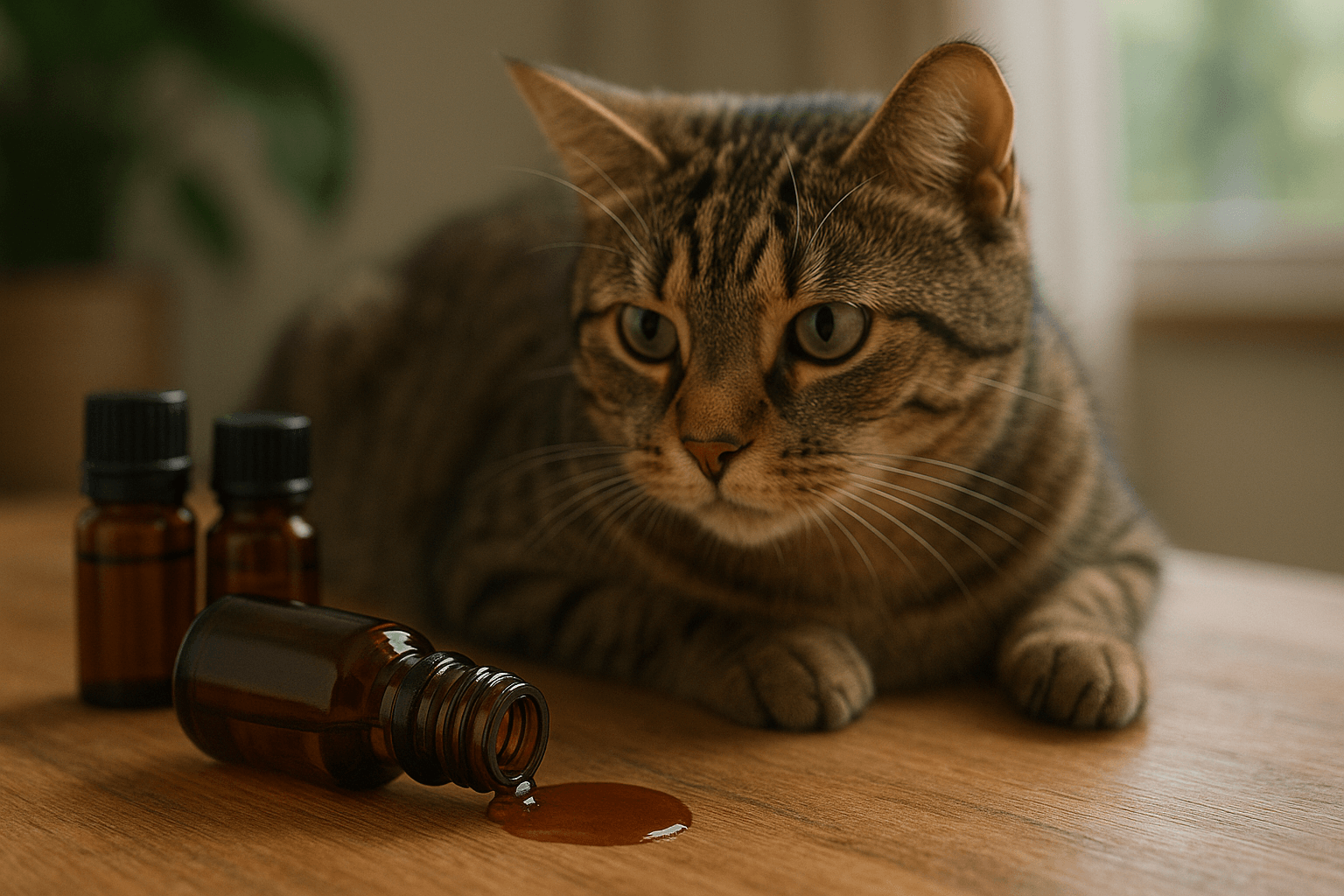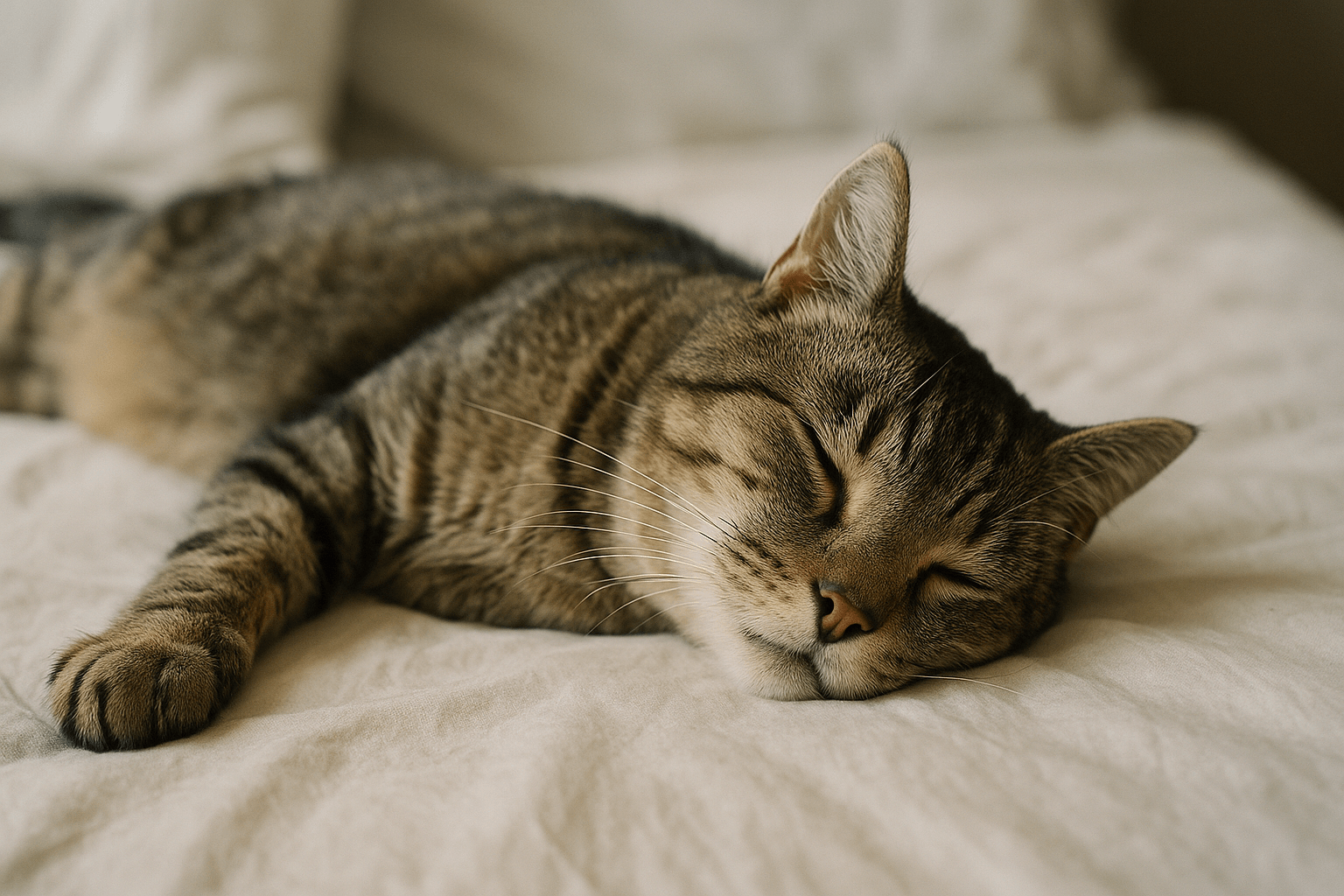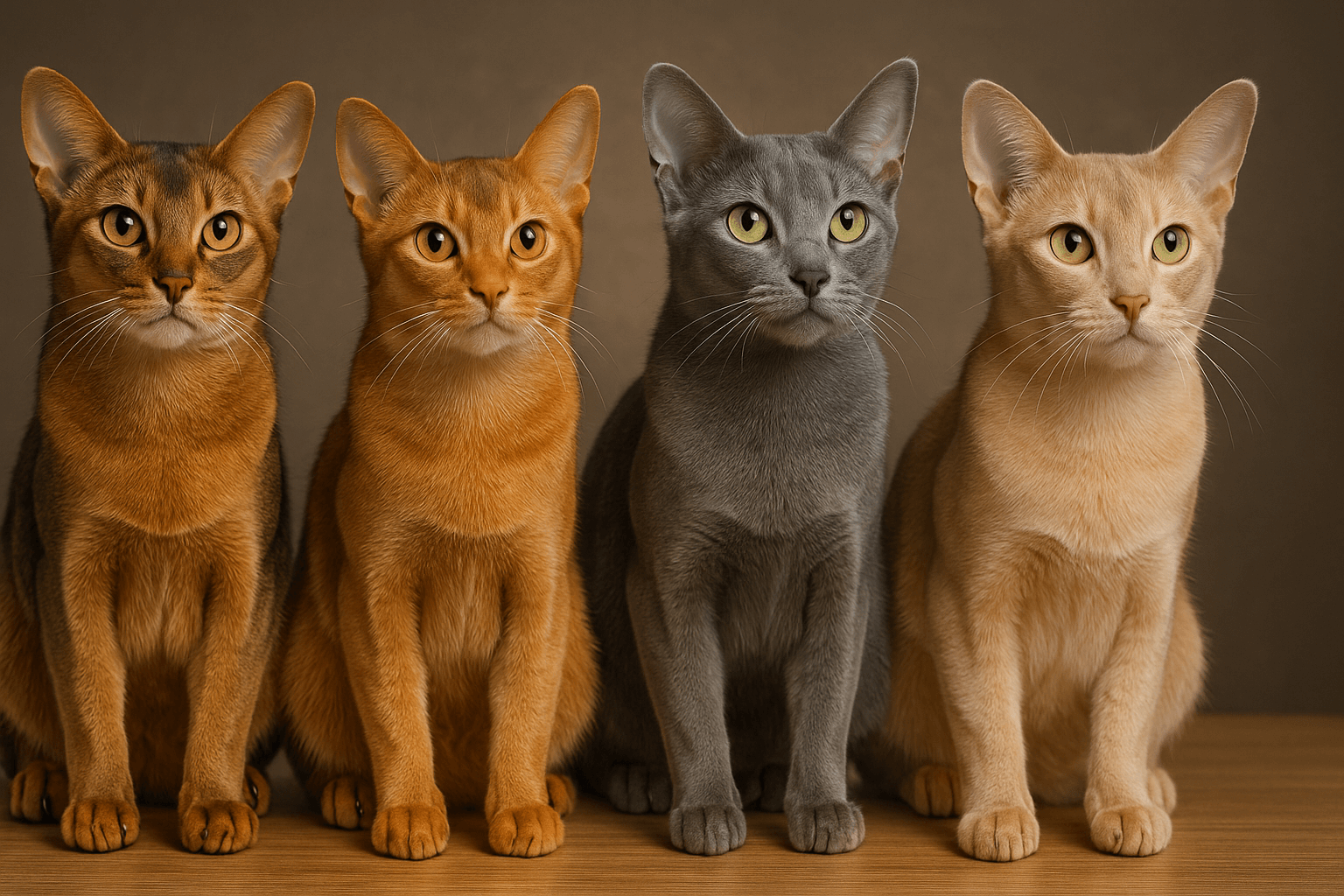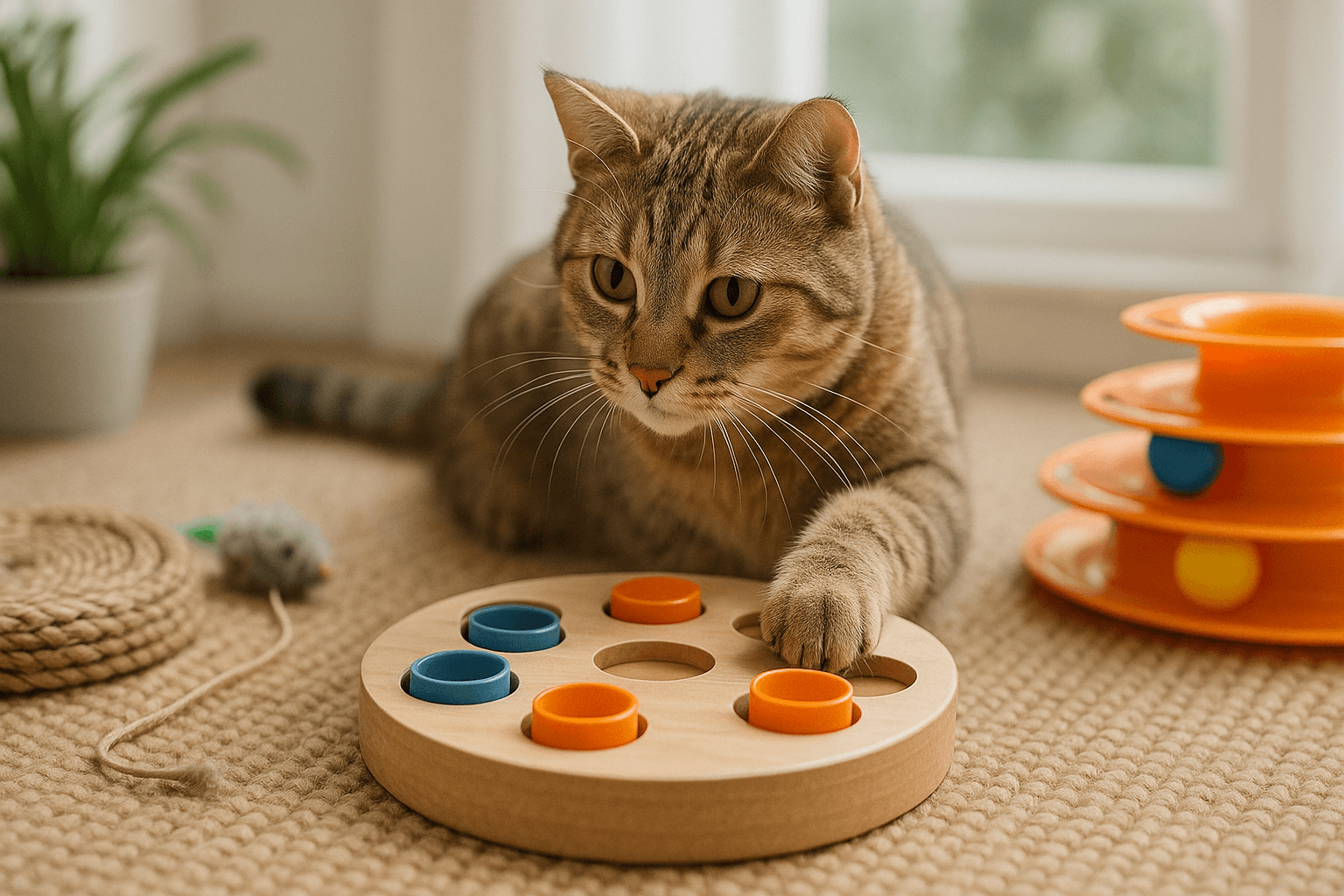Essential Oils Killed My Cat: A Warning Every Pet Owner Should Know
The use of essential oils has gained immense popularity for their aromatic and therapeutic benefits in human health. However, what many pet owners don’t realize is that these seemingly harmless natural extracts can pose a significant danger to cats. Unlike humans and even dogs, cats lack the necessary liver enzymes to metabolize certain compounds found in essential oils, making them highly susceptible to toxicity. Stories like “essential oils killed my cat” serve as sobering reminders of the importance of understanding the risks before introducing these substances into your home. This blog post will explore why essential oils are dangerous for cats, how to identify signs of poisoning, and what steps you can take to protect your feline friend.
Why Essential Oils Are Toxic to Cats
Cats are uniquely vulnerable to essential oils due to their physiology and grooming habits. Understanding why these oils are harmful is the first step in preventing tragedy.
Lack of Liver Enzymes:
Cats do not produce glucuronosyltransferase, an enzyme necessary to break down and eliminate certain compounds found in essential oils.Absorption Through Grooming:
Cats groom themselves frequently, which means any oil residue on their fur or skin can be ingested, leading to internal toxicity.High Concentration Levels:
Many essential oils are highly concentrated, and even small amounts can overwhelm a cat’s system when inhaled or absorbed.Diffusers and Airborne Particles:
Using diffusers disperses oil particles into the air, which cats inhale. Their sensitive respiratory systems can quickly become overwhelmed.Topical Application Risks:
Applying essential oils directly to a cat’s skin or fur can cause severe irritation, burns, or systemic poisoning.
Understanding these factors highlights why caution is critical when using essential oils around cats. Even products marketed as “pet-safe” should be approached with skepticism.
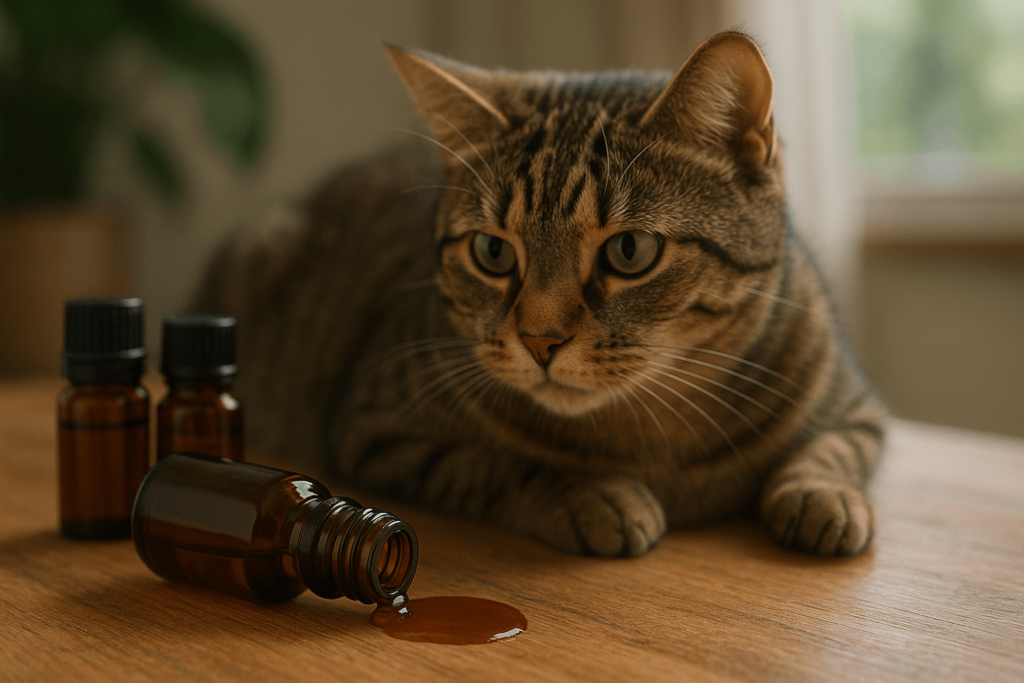
Signs Your Cat May Be Suffering from Essential Oil Poisoning
If you suspect your cat has been exposed to essential oils, recognizing the symptoms early can save their life. Here are the most common signs of essential oil toxicity in cats.
Difficulty Breathing:
Labored breathing or panting may indicate respiratory distress caused by inhaling oil particles.Excessive Drooling:
Cats often drool excessively when they ingest something toxic, including essential oils.Vomiting or Diarrhea:
Gastrointestinal upset is a common reaction to essential oil ingestion or absorption.Lethargy or Weakness:
A cat that seems unusually tired or unresponsive may be suffering from systemic toxicity.Tremors or Seizures:
Neurological symptoms like tremors or seizures are serious indicators of severe poisoning and require immediate veterinary attention.
If you notice any of these signs after essential oil exposure, seek emergency care immediately to prevent further complications.
Check this guide 👉Is Mineral Oil Safe for Cats? Best 7 Expert Tips!
Check this guide 👉CBD Oil for Cats: Best 7 Expert Tips!
Check this guide 👉Can Cats Eat Fish Oil? Best 7 Expert Tips!
Dangerous Essential Oils for Cats | Safer Alternatives for Homes with Cats |
|---|---|
Tea Tree Oil | Fresh herbs like rosemary (in moderation) |
Eucalyptus Oil | Natural ventilation methods |
Peppermint Oil | Cat-safe pheromone diffusers |
Cinnamon Oil | Non-toxic air-purifying plants |
Citrus Oils (Lemon, Orange) | Enzyme-based cleaning products |
How to Prevent Essential Oil Poisoning in Cats
Prevention is always better than cure when it comes to protecting your cat from essential oil toxicity. These practical tips can help keep your feline friend safe.
Avoid Diffusing Essential Oils Around Cats:
Never use diffusers in rooms where your cat spends time. Opt for fresh air or fans instead.Store Oils Securely Out of Reach:
Keep all essential oils in tightly sealed containers stored in cabinets or high shelves inaccessible to curious pets.Use Non-Toxic Cleaning Products:
Replace essential-oil-based cleaners with pet-safe alternatives to minimize exposure risks.Educate Family Members and Guests:
Make sure everyone in your household understands the dangers of essential oils for cats.Consult Your Veterinarian Before Use:
If you’re unsure about a product, always consult your vet before introducing it into your home.
By taking these precautions, you can significantly reduce the risk of accidental poisoning and ensure your cat remains healthy and happy.
What to Do If Your Cat Is Exposed to Essential Oils
Immediate action is crucial if your cat comes into contact with essential oils. Knowing what steps to take can make all the difference in their recovery.
Remove Your Cat from the Area:
Quickly move your cat away from the source of exposure, such as a diffuser or spilled oil.Ventilate the Space:
Open windows and doors to clear the air of lingering oil particles.Wipe Off Oil Residue:
Use a damp cloth to gently remove any oil from your cat’s fur or skin. Avoid using soap or water without consulting a vet first.Call Your Veterinarian Immediately:
Describe the situation and follow their advice closely. They may instruct you to bring your cat in for treatment.Do Not Induce Vomiting Without Guidance:
Attempting to induce vomiting can worsen the condition. Only do so under veterinary supervision.
Acting swiftly and responsibly increases your cat’s chances of recovering fully from essential oil exposure.
Common Misconceptions About Essential Oils and Pets
Many pet owners unknowingly put their cats at risk due to misconceptions about essential oils. Dispelling these myths is vital for ensuring your cat’s safety.
“Natural Means Safe”:
Just because something is natural doesn’t mean it’s safe for all species. Cats process substances differently than humans.“Diffusers Are Harmless”:
Even passive diffusion can expose cats to toxic levels of oil particles over time.“Dilution Makes It Safe”:
Diluting oils does not eliminate the risk entirely, as cats still struggle to metabolize the active compounds.“Only Certain Oils Are Dangerous”:
While some oils are more toxic than others, many commonly used oils pose significant risks.“A Little Won’t Hurt”:
Even small amounts of essential oils can overwhelm a cat’s delicate system.
Clarifying these misconceptions empowers pet owners to make informed decisions about essential oil use.
Alternative Ways to Freshen Your Home Safely
You don’t need essential oils to maintain a fresh-smelling home. These pet-safe alternatives are effective and non-toxic for cats.
Baking Soda:
Sprinkle baking soda on carpets and furniture, then vacuum it up to neutralize odors naturally.White Vinegar:
Mix white vinegar with water for an all-purpose cleaner that won’t harm your cat.Activated Charcoal Bags:
Place charcoal bags around your home to absorb unpleasant smells without releasing harmful chemicals.Fresh Air Ventilation:
Open windows regularly to allow fresh air to circulate and eliminate stale odors.Cat-Safe Air Purifiers:
Invest in an air purifier designed specifically for pet households to filter out allergens and odors.
These options ensure a clean, fresh home without compromising your cat’s well-being.
Creating a Pet-Friendly Emergency Plan
Being prepared for emergencies involving essential oil exposure can save your cat’s life. Follow these steps to develop a plan tailored to your household.
Keep Emergency Contacts Handy:
Save your veterinarian’s number and the nearest animal poison control hotline in your phone.Assemble a First Aid Kit:
Include items like saline solution, gauze, and a damp cloth for quick response to oil exposure.Identify Safe Spaces:
Designate areas free of essential oils where your cat can retreat during cleaning or diffusing activities.Practice Calm Reactions:
Stay composed during emergencies to act efficiently and avoid panicking your cat further.Review Safety Protocols Regularly:
Update your knowledge and supplies periodically to stay prepared for potential incidents.
A solid emergency plan ensures you’re ready to protect your cat in any situation.
Frequently Asked Questions About Essential Oils and Cats
Are all essential oils dangerous for cats?
No, but many popular oils like tea tree, eucalyptus, and citrus oils are highly toxic. Always research before use.
Can I use diluted essential oils safely?
Even diluted oils can harm cats due to their inability to metabolize certain compounds. It’s best to avoid them entirely.
Is it safe to use essential oils in candles?
Burning candles with essential oils releases toxins into the air, posing inhalation risks for cats. Opt for unscented candles instead.
What should I clean spills with if my cat is nearby?
Use plain water or pet-safe cleaning products to avoid introducing additional hazards.
Can essential oil exposure kill a cat?
Yes, severe exposure can lead to organ failure or death. Immediate veterinary care is critical in suspected cases.
Protecting Your Cat from Essential Oil Dangers
The tragic phrase “essential oils killed my cat” serves as a powerful reminder of the hidden dangers lurking in our homes. While essential oils offer numerous benefits for humans, they simply aren’t worth the risk when it comes to our feline companions. By educating yourself about the risks, recognizing symptoms of toxicity, and taking proactive measures to safeguard your home, you can ensure your cat remains safe and healthy. Remember, no fragrance or remedy is more valuable than the life of your beloved pet. With care and vigilance, you can enjoy the benefits of aromatherapy while keeping your furry friend out of harm’s way.
How Do I Know If My Cat Died Peacefully? Best 7 Expert Tips! Discover the quiet signs of a peaceful feline passing and find comfort in their final moments.
How Do I Know If My Cat Died Peacefully? A Gentle Guide for Heartbroken Owners Losing a cat is not just …
Why Do Abyssinian Cat Colors Matter? Best 7 Expert Tips! Discover the genetics, rare hues, and care secrets behind Abyssinian coat colors for a healthier, happier cat.
Cat Enrichment Activities: Best 7 Expert Tips! Unlock your cat’s natural instincts with proven strategies for mental stimulation, physical health, and lasting happiness.

